When you consider happiness and look at it from a distance, you will find that there are 3 things that can determine your happiness:
1. Your genetics
2. Your internal state of mind
3. Your circumstances
Any source of happiness (or unhappiness) can be tied back to one of these factors.
Our new study has found how much these factors are believed to contribute to our happiness, by asking 1,155 people from around the world.
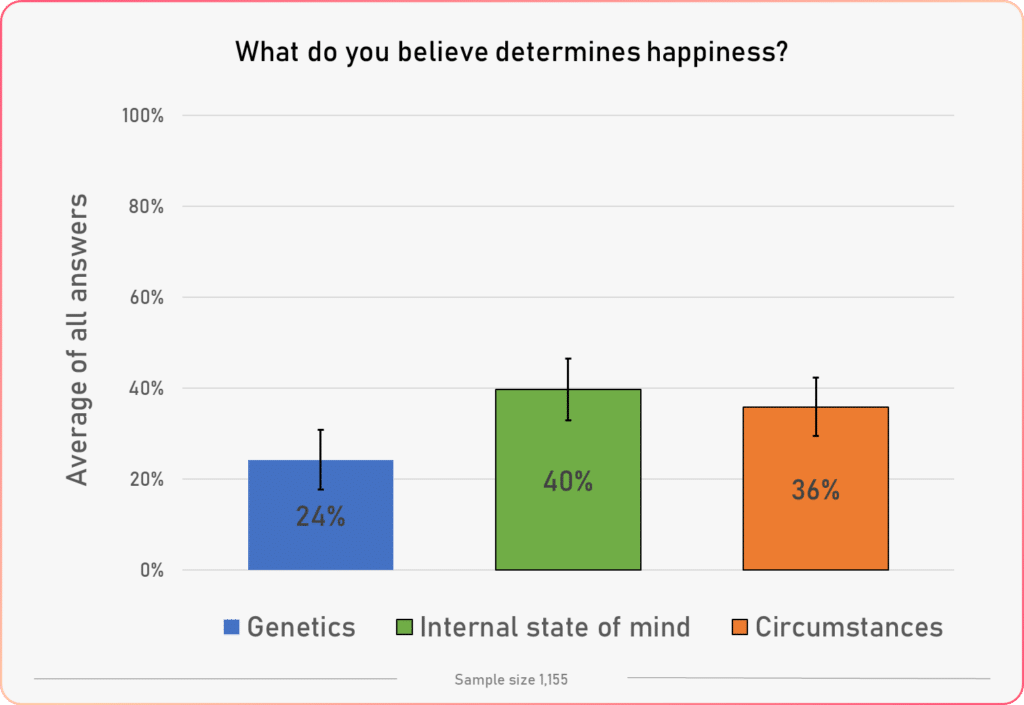
Our study aims to answer critical questions that come to mind with these new insights. Which groups of people are inclined to think that happiness is more circumstantial? What makes people think that more of their happiness is genetic?
(Click here to have a look at the summarized results of this study on our infographic!)
Contents
What factors determine our happiness?
As mentioned in the introduction, our happiness can be determined by 3 factors:
1. Our genetics
2. Our internal state of mind
3. Our circumstances
How much of our happiness is determined by our genetics has been the topic of many studies. In short, every single person has a “happiness setpoint”. This is a level of happiness that is natural to us, a part of our genetics, and cannot be changed.
Then, there is the happiness that is a part of our internal mindset. This is a part of our happiness which we can influence. We can often influence the way we react to rainy weather, a traffic jam or a stressful day at the office. That’s the part of our happiness that is determined by our internal state of mind.
Finally, there are always external circumstances that will influence a part of our happiness. Even though we can change our internal mindset about the rainy weather, we would still be happier if it was just another sunny day. These are the circumstances that will always have an influence on our happiness.
These examples are grossly simplified, but in theory, it boils down to the following principle:
Any source of happiness (or unhappiness) can be tied back to one of these 3 factors.
How much is our happiness to be determined by these factors?
Our survey questioned 1,155 respondents on their happiness, by asking a very specific question:
If you look back at the last year of your life, how much of your happiness was dependent on genetics, circumstances and your internal state of mind?
Each of the 1,155 respondents provided answers based on a range from 0 to 100%, with intervals of 10%.

(A footnote was added that reminded respondents that the total of all 3 factors must add to 100%. When the total didn’t match 100%, the individual factors were scaled up or down pro-rato, so that the total would match 100%.)
The 1,155 answers are presented in the 3 histograms below:
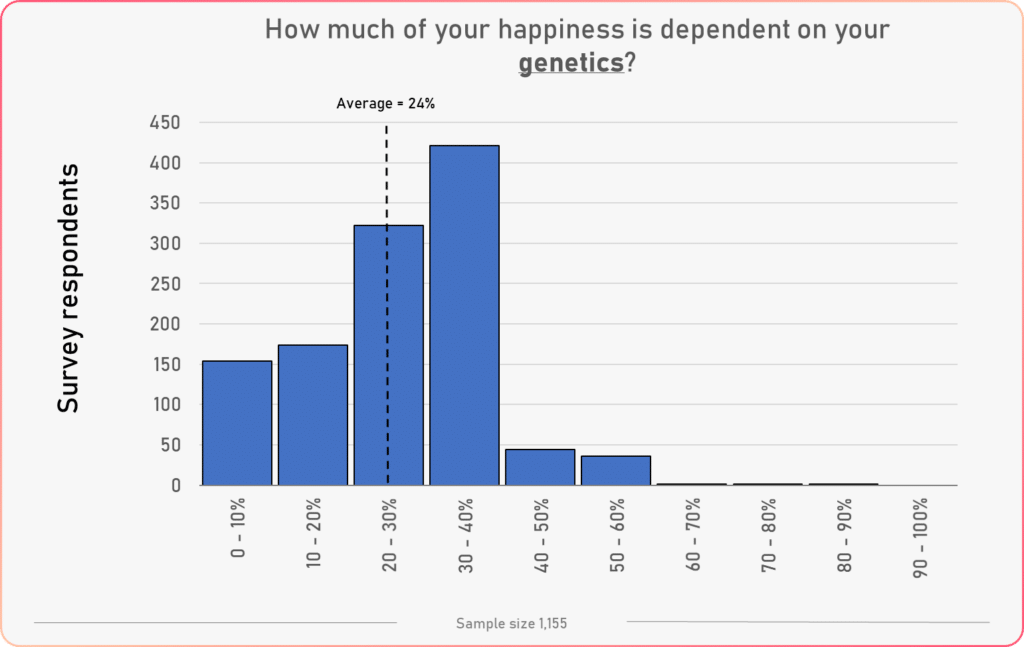
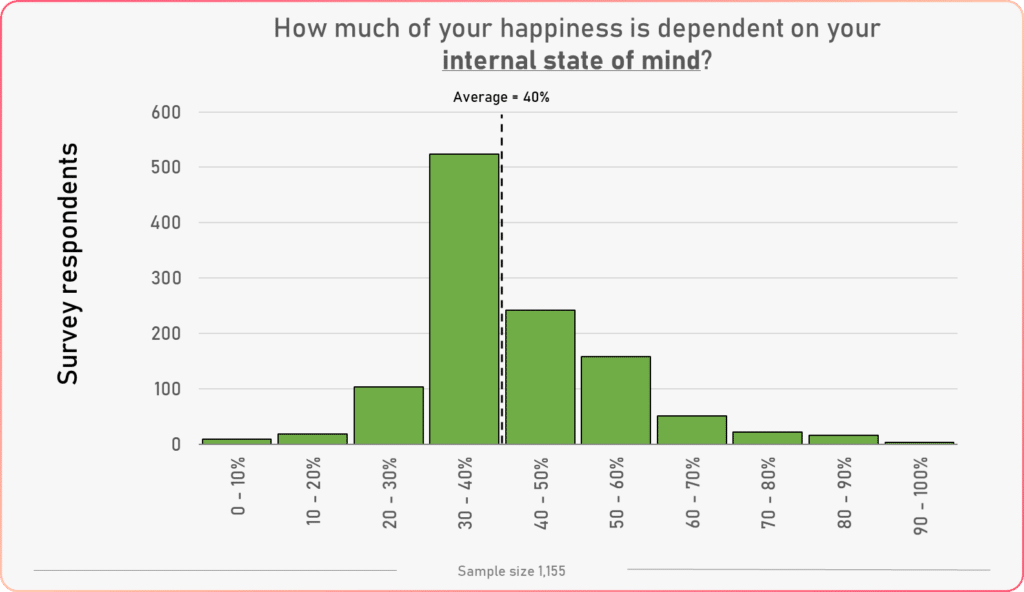
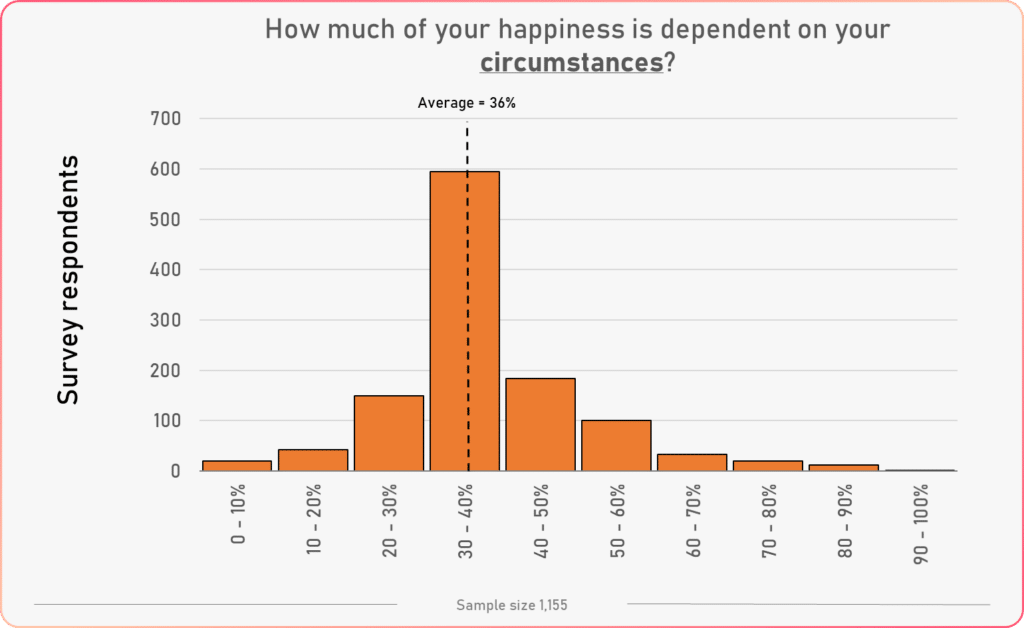
The averaged answers to these questions result in a new division of how much each factor is believed to influence our happiness.

This image shows that happiness is believed to be determined by the following factors and their weight:
- 24% by our genetics.
- 40% by our internal state of mind.
- 36% by our circumstances.
Due to the large distribution of answers, we wanted to determine what influenced the answers of our respondents the most. In other words, are there variables within our dataset that can predict the division of the 3 happiness factors?
To find out, we asked each respondent a number of questions, ranging from overall happiness rating to employment status.
The correlations we found from these questions will be covered in the following chapters.
Happiness rating
The happiness rating of the respondents had an interesting correlation to the weight of the 3 happiness factors.
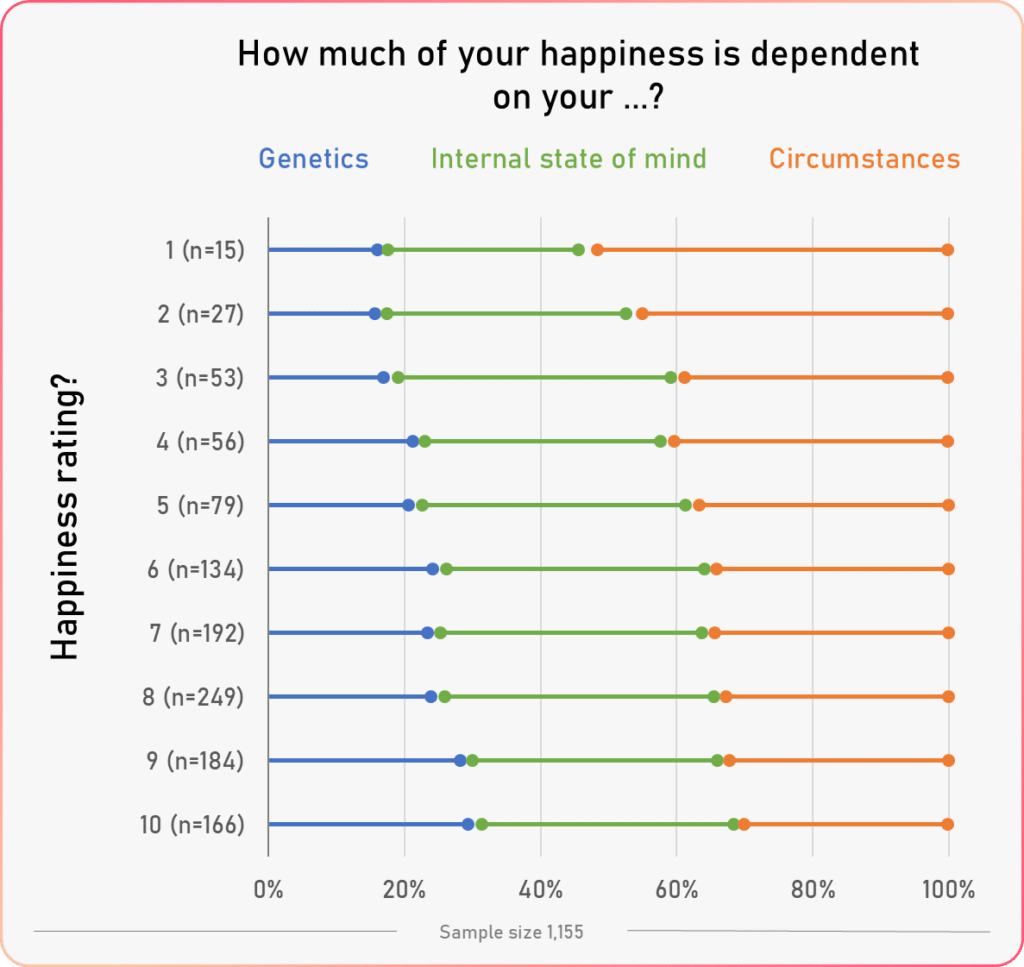
We asked the respondents the following question about their happiness:
If you look back at the last year of your life, how would you rate your happiness on a scale from 1 to 10?
We then grouped all respondents based on their answers. Finally, we averaged the percentages of each happiness factor.
It’s interesting to see the correlation between feeling happy and believing were that happiness is coming from.
What experts say…

Alex Cencerrado, Senior Data Analyst @ Happiness Research Institute and the Happiness Museum
The proportion of unhappy people that think their happiness is caused by their circumstances is very interesting. I think it shows how our (lack of) self-esteem tries to save us; If we are happy, it’s due to our personality. On the other hand, if we are unhappy, it has to be external circumstances.
The happiest people amongst our respondents believe that a bigger part of their happiness is determined by their genetics. These people simultaneously believe that a smaller part of that happiness is determined by external circumstances.
In fact, when comparing the happiest people in our dataset to the unhappiest, we noticed an interesting difference:
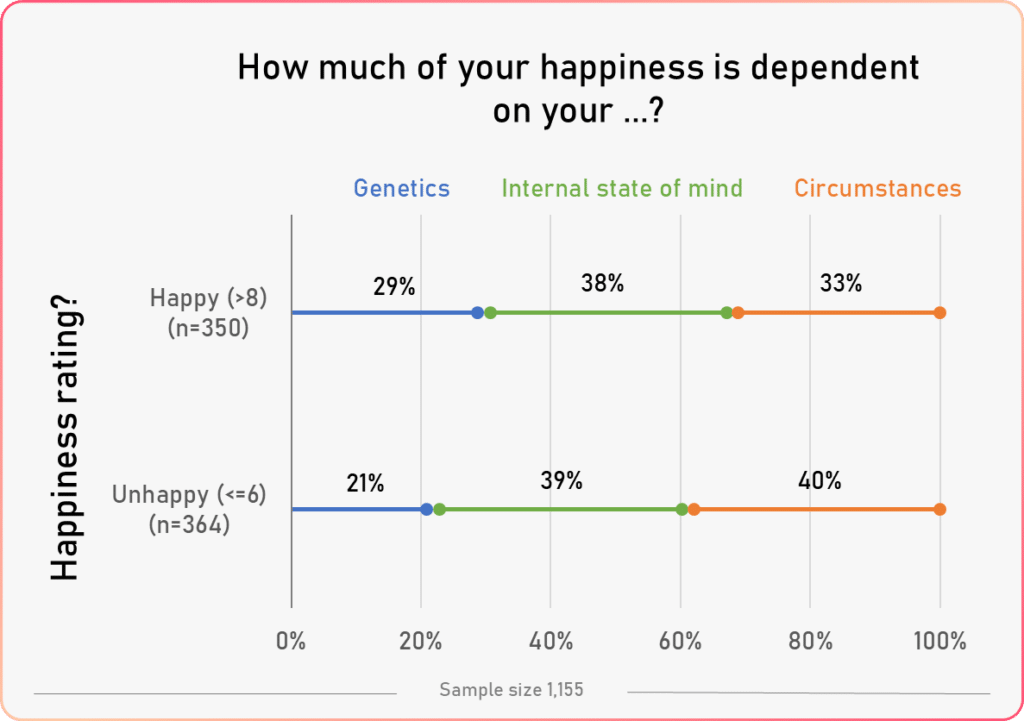
This image shows how differently happy people think versus unhappy people. Happy people are inclined to think that their happiness is determined more by genetics instead of circumstances.
What experts say…

Dr. Robert Puff, Host of the Happiness Podcast & bestselling author
Happiness is amazingly influenced by our thoughts. This new study clearly demonstrates the link between what we believe and what we experience. When we take ownership of our happiness, then we will, as this study suggests, most likely be happier.
We can have beautiful lives, and believing that we have control over our happiness is one of the steps towards happiness.
This difference can potentially be explained by the self serving bias.
For example, a happy person might say: “I am happy, and that’s just because I am the way I am. It must be my genetics”.
Whereas an unhappy person might say: “I am unhappy, yet I want to be happy, so it must be my external circumstances that keep me from being happy”.
What’s good to mention is that our self reported happiness has no actual link to our genetics. Even though our happiness doesn’t influence the way our genetics work, it does seem to influence our belief of how much of our happiness is determined by genetics.
Controlling happiness
We asked each respondent whether or not they believe that happiness is something you can control.
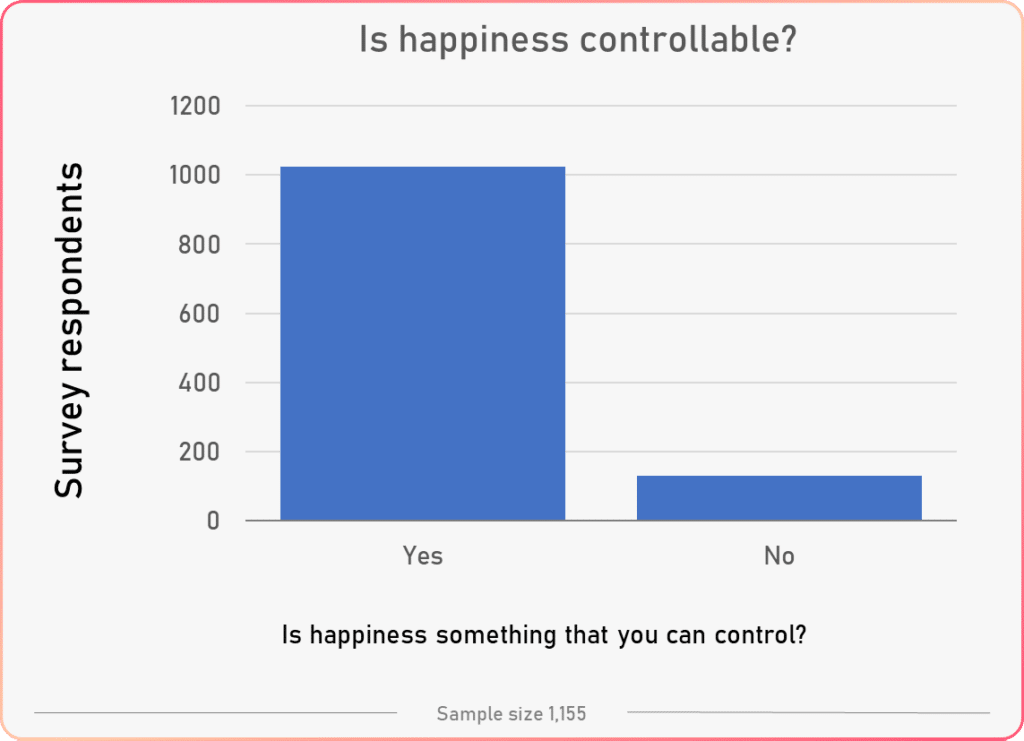
Whether they answered yes or no had an interesting impact on what happiness factor they believed had the biggest impact on their happiness.
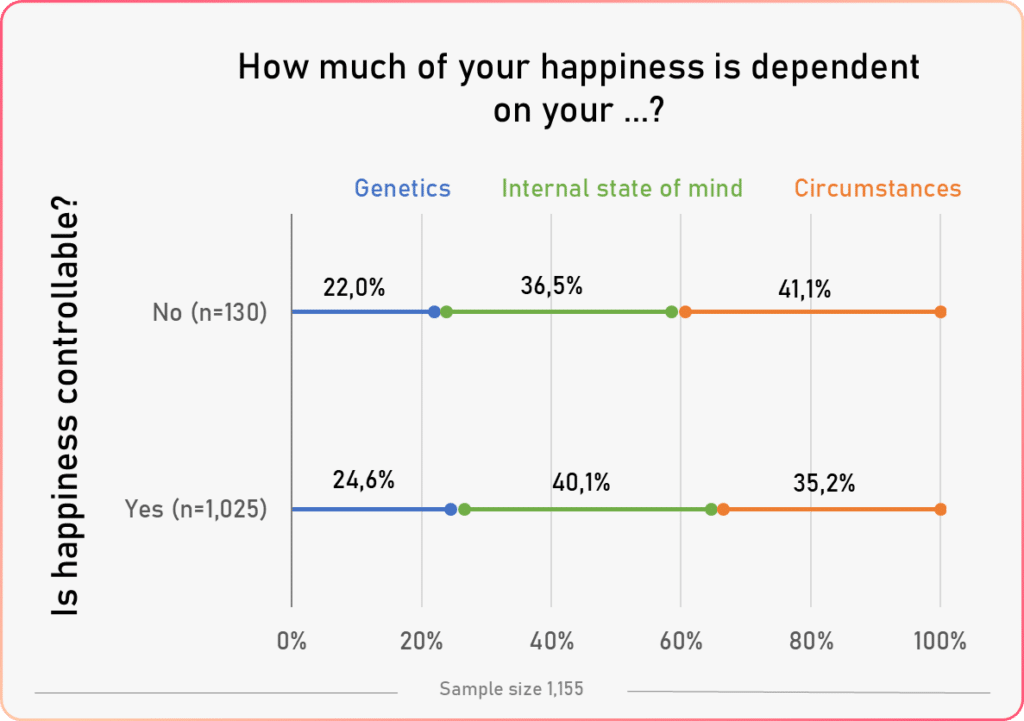
This suggests that people who believe happiness is controllable also believe that their happiness is less a result of circumstantial and more a result of their internal state of mind.
In other words, this group of people believes that their mindset has a stronger influence on their happiness than external circumstances.
Gender
The gender of our respondents had a small influence on how much each factor is believed to contribute to our happiness.
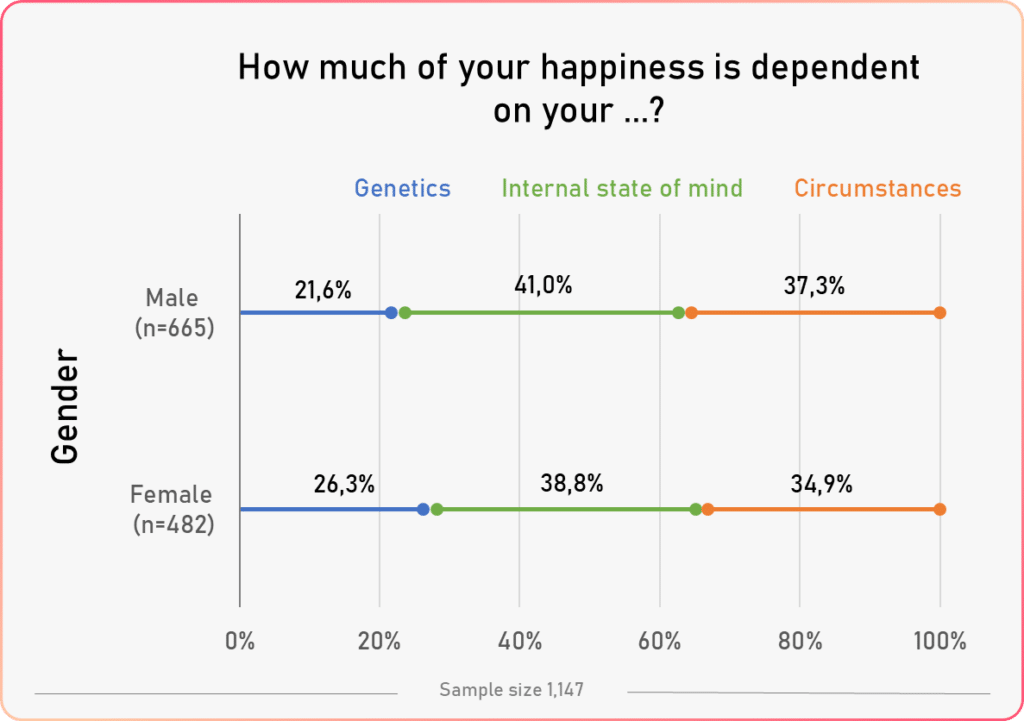
What stands out is that female respondents believed on average that a bigger part of their happiness is genetical.
The difference between men and women is 4.6% (21.6% for men vs 26.3% for women).
Based on these percentages, it can be implied that women believe that their happiness is 21% more genetical than men.
Some studies have found that women are more prone to swings in mood, caused by hormonal swings. This could be a cause for this difference between male and female respondents.
Age
The amount of happiness that is believed to be caused by the 3 factors changes with our age.
This is shown in the chart below:
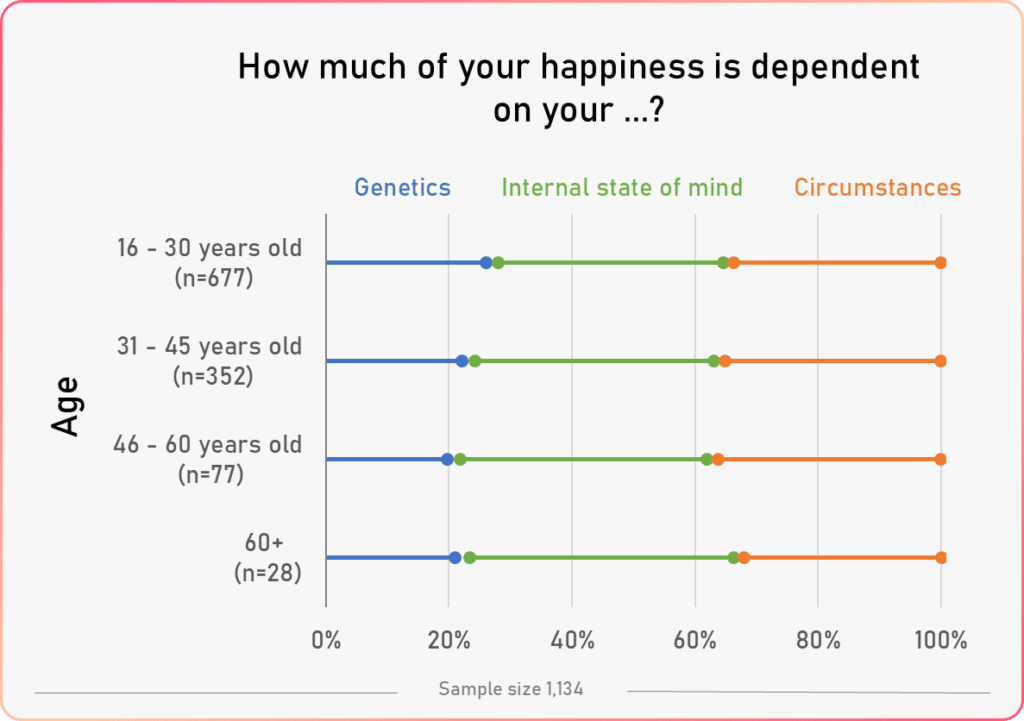
It’s interesting to see how our age impacts our beliefs, especially our belief on how much our genetics influence our happiness.
The average percentages per age group are as follows:
- 16 – 30 years old: 26.1%
- 31 – 45 years old: 22.1%
- 45 – 60 years old: 19.7%
- 60+ years old: 21.1%
The percentage of our happiness that is believed to be determined by genetics decreases as we age, and reaches a dip when we’re between 45 and 60 years old. From there, the influence of genetics on our happiness increases again.
There is a lot of interesting research on the effect of our age on genetics. This study claims that our genetics can change up to 20% as we age. In addition, this study supports that a part of our DNA can change over time.
This is an interesting comparison, because the results of our study imply that our belief of our genetics – and its effect on our happiness – can change as well.
Education
High school graduates tend to feel like a bigger part of their happiness is circumstantial when compared to people with a Bachelor’s or Master’s degree.
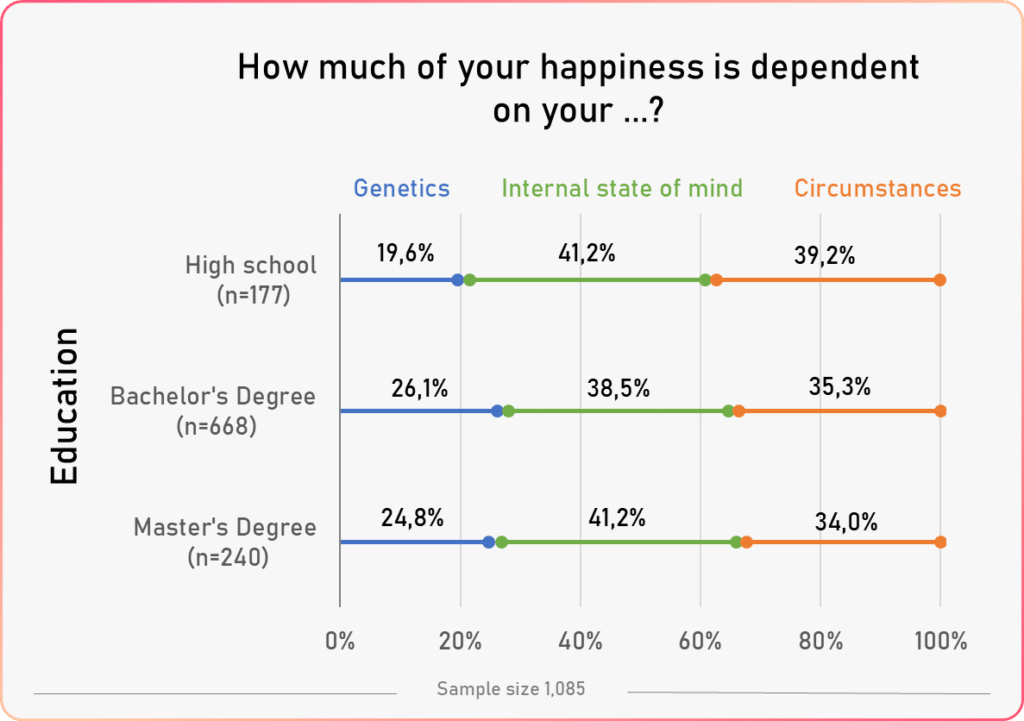
We surveyed the respondents about their educational background:
What is the highest degree or level of education you have completed?
Answers showed a negative correlation between educational background and the amount of circumstantial happiness. In other words, a higher level of education predicts a lower percentage of happiness that is circumstantial, according to the respondents.
Marriage
Interestingly, those who are married tend to believe that a bigger part of their happiness is genetical, according to the respondents.
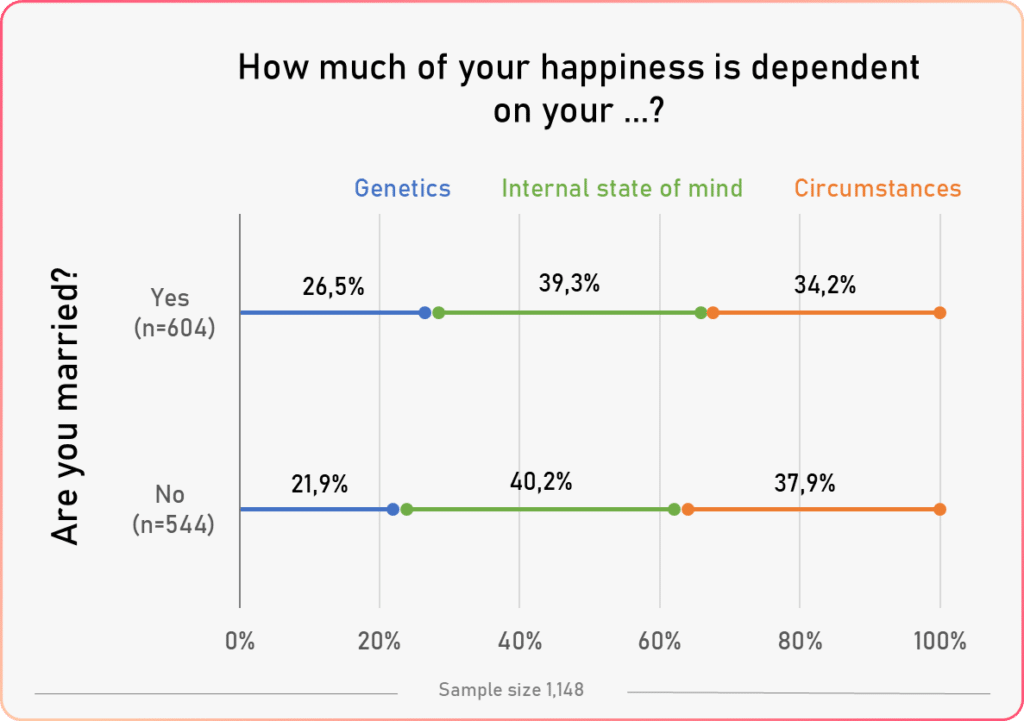
Married people think that 26.5% of their happiness is determined by genetics, while unmarried people indicate that this percentage is 21.9%.
Commentary from the team:

Hugo Huijer, Founder of Tracking Happiness
If this proves anything at all, it’s that the answers of our respondents need to be interpreted cautiously. Being married or not simply cannot influence our actual genetics.
Just because the answers of our respondents show a notable difference only means that our marital status can influence our belief of how much happiness is genetical.
In addition, this is a good example of a correlation that doesn’t prove causation. It’s more likely that married people are happier, and as a result, are more inclined to attribute a bigger part of their happiness to their genetics.
Employment status
Respondents were asked the following question:
What is your current employment status?
They were able to choose out of the following answers:
- Employed full-time (n=836)
- Employed part-time (n=138)
- Not employed (n=42)
- Retired (n=17)
- Seeking opportunities (n=48)
- Student (n=52)
- Prefer not to say (n=22)
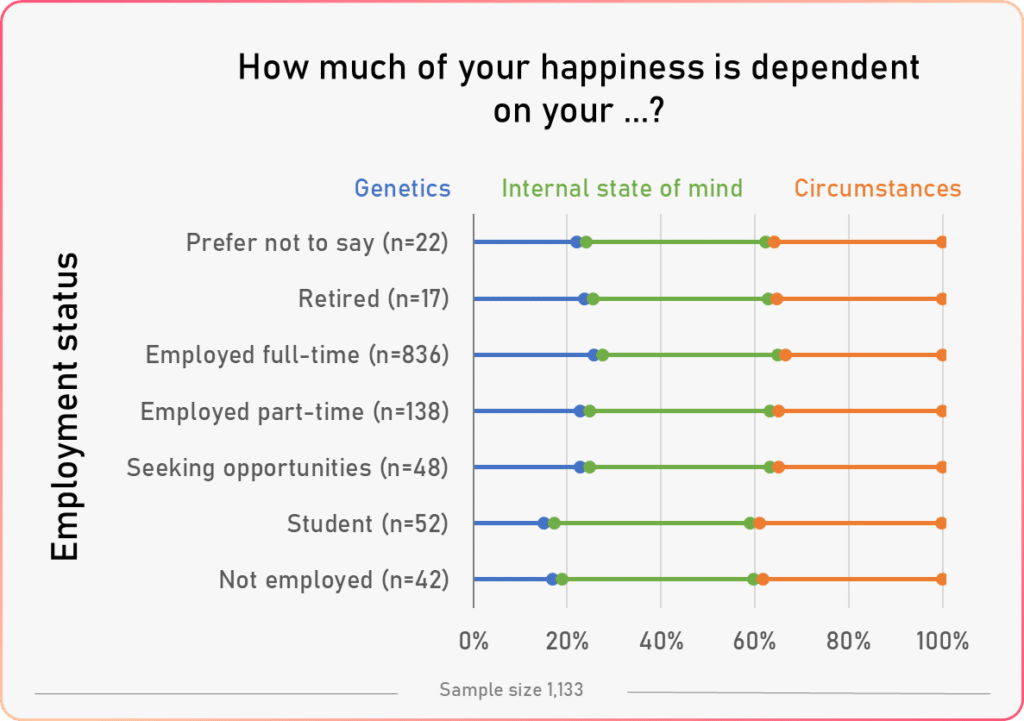
Students feel like their happiness is most dependent on circumstances, compared to people with other employment statuses. On average, students feel like 40.9% of their happiness is circumstantial.
This is 14% higher than the 36% average of all 1,155 respondents. This 40.9% is also the same average percentage as the people who rated their happiness with a 3 on a scale from 1 to 10
The answers suggest that between finishing college (student) and finding a job (employed), the percentage of your happiness that is circumstantial decreases from 40.9% to 35.2%.
Children
Having children did not seem to have a strong influence on the happiness factors, according to the responses.
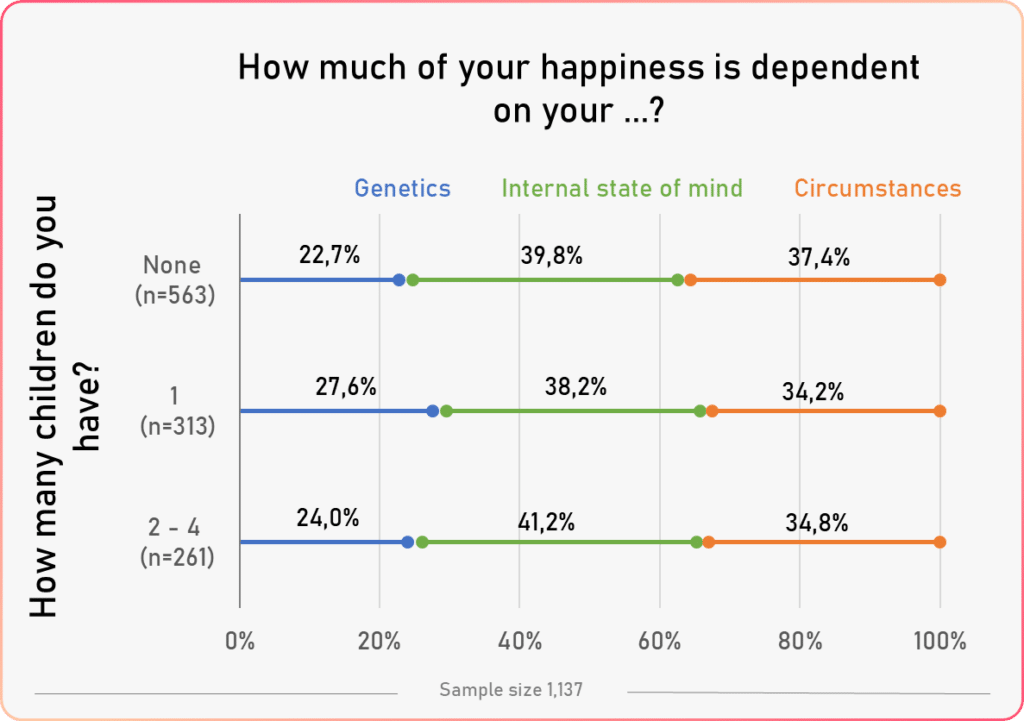
Previous research on happiness factors
A popular 2005 paper aimed to find how the 3 factors of this study compared to one another.
This paper was called ‘Pursuing Happiness: The Architecture of Sustainable Change‘ in 2005. The results of this paper have become popular after the release of the book “The How Of Happiness” in 2007, which featured the “happiness pie“. This happiness pie explains how our happiness is determined as followed:
- 50% of our happiness is determined by our genetics.
- 10% of our happiness is determined by our circumstances.
- 40% of our happiness is determined by our internal state of mind.
The book includes a pie chart similar to the one visualized below:
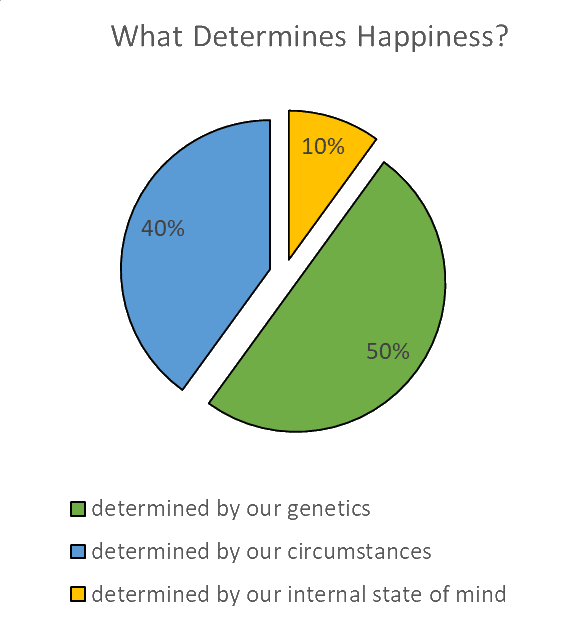
Methodology
Where the existing paper on the happiness pie differs from the study performed by our team, can be summarized as follows:
- The “happiness pie” was determined from analyzing prior studies from 1996 and 1999. The weight of each factor was determined from the correlations as found in these prior studies.
- Our new study adds a different point of view. We asked a large group of people about the 3 happiness factors and analyzed the self-reported answers.
If you’re looking for more information on how the study was performed, this article provides an overall introduction to this study. It also includes links to other result articles that are relevant to this study.
Want to know more details? Like who was surveyed, what are the demographics of the respondents, and how the study was performed? Here is a link to a document that explains it all (opens in a new window):
Infographic of our study
The infographic below summarizes the key takeaways from our study.
Use the following embed code to share this infographic on your website:
<div style="“clear:both”">
<a href="https://www.trackinghappiness.com/controlling-happiness-new-study-results/"><img src="https://www.trackinghappiness.com/wp-content/uploads/2020/10/happiness-factor-study-infographic-2.jpg" data-spai="1" alt="happiness factor study infographic 2" width="675px" border title="What Factors Determine Our Happiness? Analyzing 1,155 answers.
"></a></div>
<div><strong>Courtesy of <a href="https://www.trackinghappiness.com/">Tracking Happiness</a></strong></div>Closing words
What do you think of these results? Let us know in the comments below!
Tracking Happiness, 2020. What Factors Determine Our Happiness? (New Study Shows Answers). [online] Tracking Happiness. Available at: https://www.trackinghappiness.com/happiness-factor-study/ [Accessed 19 October 2020]

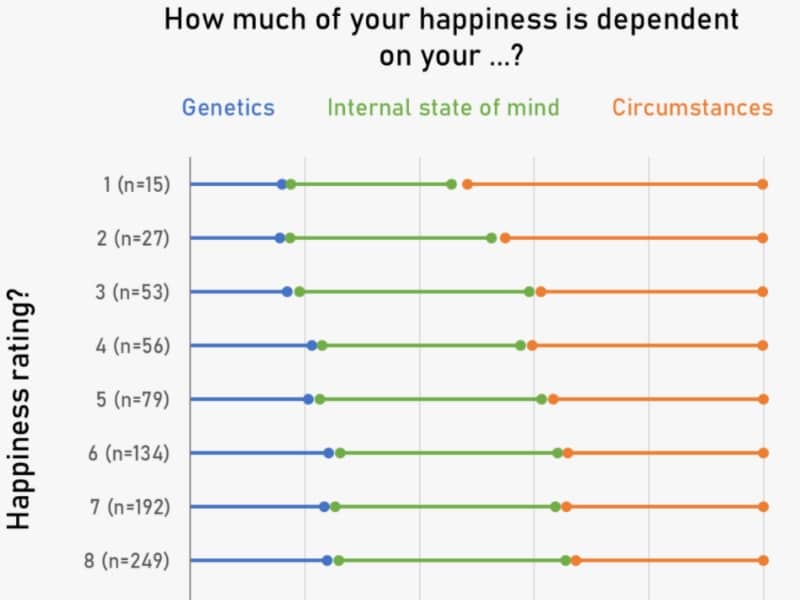

Awesome.
Surely culture also plays a role in determining happiness
I’ve worked amongst people of different ethnicities and cultures. Many African, Asian and South American people seem to maintian higher levels of happiness under adverse conditions than the Europeans or Middle Eastern people do. Where does the difference come in: their different expectation from life?
That’s definitely true. A good example is Costa Rica, which has always been a relatively happy country when compared to its neighbors. Here’s an interesting read that explains some of the factors that cause this.